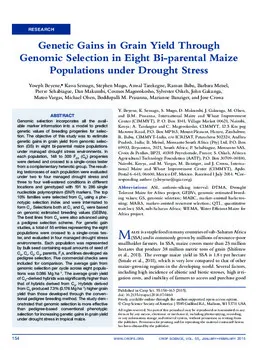Genetic gains in grain yield through genomic selection in eight bi-parental maize populations under drought stress

Abstract
Genomic selection incorporates all the available marker information into a model to predict genetic values of breeding progenies for selection. The objective of this study was to estimate genetic gains in grain yield from genomic selection (GS) in eight bi-parental maize populations under managed drought stress environments. In each population, 148 to 300 F2:3 (C0) progenies were derived and crossed to a single-cross tester from a complementary heterotic group. The resulting testcrosses of each population were evaluated under two to four managed drought stress and three to four well-watered conditions in different locations and genotyped with 191 to 286 single nucleotide polymorphism (SNP) markers. The top 10% families were selected from C0 using a phenotypic selection index and were intermated to form C1. Selections both at C1 and C2 were based on genomic estimated breeding values (GEBVs). The best lines from C0 were also advanced using a pedigree selection scheme. For genetic gain studies, a total of 55 entries representing the eight populations were crossed to a single-cross tester, and evaluated in four managed drought stress environments. Each population was represented by bulk seed containing equal amounts of seed of C0, C1, C2, C3, parents, F1s, and lines developed via pedigree selection. Five commercial checks were included for comparison. The average gain from genomic selection per cycle across eight populations was 0.086 Mg ha?1. The average grain yield of C3?derived hybrids was significantly higher than that of hybrids derived from C0. Hybrids derived from C3 produced 7.3% (0.176 Mg ha?1) higher grain yield than those developed through the conventional pedigree breeding method. The study demonstrated that genomic selection is more effective than pedigree-based conventional phenotypic selection for increasing genetic gains in grain yield under drought stress in tropical maize.
